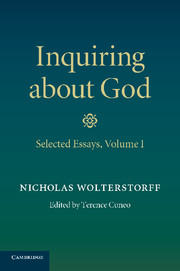Book contents
- Frontmatter
- Contents
- Editor's introduction
- Acknowledgments
- Introduction
- 1 Analytic philosophy of religion: retrospect and prospect
- 2 Is it possible and desirable for theologians to recover from Kant?
- 3 Conundrums in Kant's rational religion
- 4 In defense of Gaunilo's defense of the fool
- 5 Divine simplicity
- 6 Alston on Aquinas on theological predication
- 7 God everlasting
- 8 Unqualified divine temporality
- 9 Suffering love
- 10 Is God disturbed by what transpires in human affairs?
- 11 The silence of the God who speaks
- 12 Barth on evil
- 13 Tertullian's enduring question
- Bibliography
- Index
3 - Conundrums in Kant's rational religion
Published online by Cambridge University Press: 04 May 2010
- Frontmatter
- Contents
- Editor's introduction
- Acknowledgments
- Introduction
- 1 Analytic philosophy of religion: retrospect and prospect
- 2 Is it possible and desirable for theologians to recover from Kant?
- 3 Conundrums in Kant's rational religion
- 4 In defense of Gaunilo's defense of the fool
- 5 Divine simplicity
- 6 Alston on Aquinas on theological predication
- 7 God everlasting
- 8 Unqualified divine temporality
- 9 Suffering love
- 10 Is God disturbed by what transpires in human affairs?
- 11 The silence of the God who speaks
- 12 Barth on evil
- 13 Tertullian's enduring question
- Bibliography
- Index
Summary
In his Critique of Practical Reason, Kant argued that the Summum Bonum is a necessary ideal of practical reason. Acknowledging morality as real requires that we also think of such a state as real. One aspect of the Summum Bonum is that in it, each person's happiness is directly proportioned to that person's moral worth. Obviously this present life does not qualify as such a state, nor are we as human beings capable of bringing about such a state. Accordingly, Kant drew the conclusion that, for there to be such a state, there must be a God who proportions happiness to virtue, and we ourselves must enjoy some sort of “immortal” existence transcending this present physical/historical existence of ours. Another aspect of the Summum Bonum is that, in it, each person can endlessly progress in the direction of ideal moral worth – hence also in the direction of complete happiness. Or to put the same point differently, the Summum Bonum is that state in which it is possible for us, whatever we may have done in the past, to advance toward becoming persons entirely well-pleasing to God. God will express pleasure over our advance in moral worth by granting to us ever greater happiness.
In Religion within the Limits of Reason Alone, Kant speaks again of the Summum Bonum, only now from the side of religion rather than from the side of morality.
- Type
- Chapter
- Information
- Inquiring about God , pp. 56 - 67Publisher: Cambridge University PressPrint publication year: 2010
- 1
- Cited by



